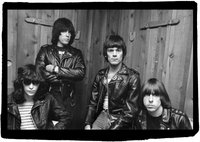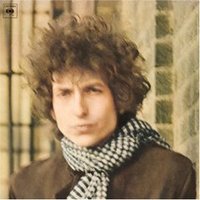
This past July, my brother and I went to
Chicago, along with a friend of ours, to attend the first annual
Pitchfork Music Festival.
We didn’t have to check the name of the station to know when to get off of the ‘L’ – we just followed the mob of tight jeans, tighter t-shirts, and Converse All-Stars towards
Union Park.
“Yes, I’m sure I’m going the right way,” I overheard one girl say into her cell phone, “there are hundreds of people wearing stripes and glasses.”
We were a little late, but we got through the gates just in time to secure some decent spots for the third main stage act of the day – Man Man. But before we were treated to their absurdly garish and exhilaratingly primitive live show, the emcee for the weekend came out onto the stage. He was a short, huffy man full of blustering energy and bombastic hyperbole. He must have been in his forties. Throughout the weekend he made overblown comments about the importance of each band, the importance of Chicago as a musical center, and the new musical revolution. He exhorted us all to start our own bands in the cafeterias of our high schools (underestimating the average age of festival attendees by an unjust 2-5 years, at least!). He enthused until his face turned red and the veins popped out of his neck.
The generation gap was painfully obvious to everyone in attendance. At first there were just grumbles and side comments to no one in particular, but as the day got longer (and the 21+ faction made more and more use of their wristbands, no doubt), the crowd got less and less polite. Soon our hyperactive Uncle Pitchfork was being peppered with audible impatience from the crowd – even boos and such clever remarks as “Get off the stage!” None of us were interested in listening to some dude who looked like our manager at the hardware store tell us about the importance of the music we enjoyed. If there’s one thing you’ve got to learn about indie rock, it’s that you can't over-hype it. And we certainly didn’t want any part in any kind of “revolution.” That’s the kind of crap that O.A.R. sings about. And we all knew that O.A.R. sucks. That’s why we were here, at the Pitchfork festival and not at 10,000 Lakes or some such hippyfest. You see, the word “revolution” no longer means anything in the syntax of pop music. It has become an empty signifier, no more meaningful than “baby baby” or “coo-coo-ca-choo.” Exactly what kind of revolution are O.A.R fans going to participate in after listening to “Crazy Game of Poker?” The "Hookah and High Life and Stay On Campus This Summer" Revolution?
The truth is, the concept of revolution (in any form) is no longer viable in popular music. There are no important artists in 2006. There is no music that must be made. There is no voice of our generation. For the first time ever, the best pop music being made is not serving any cultural or generational need. Warhol has become ubiquitous; all art is pop art, all art is accessible, and all art is commodity.
In the past, pop music has served some sort of social/cultural goal. In the fifties, early rock ’n’ roll music challenged the morals of its time – introducing hints of sex and danger to mainstream radio. Then in the sixties, not only were sexual mores pushed even further, but pro-drug and anti-authority ideals produced America’s first substantial counter-culture. It took most of the seventies to get over the aftershocks of the previous decade, but by 1977 punk was born. This introduced a new disillusioned counter-culture, tired of the hypocrisy of the hippies’ ideals and discovering their sense of humanity through a symbolic self-destruction. The eighties found bands funneling this disillusionment through more artistic and experimental structures and were dominated by post-punk and new-wave (note that I am concentrating on the “historically-significant” and not necessarily most popular music of these decades, though early on these were one and the same). The nineties were marked by the fad of grunge and the rise of indie rock as the most “significant” (critically/historically) music of its time. In my opinion, Pavement were the last “important” or “significant” rock band, because they combated the very idea of importance; they tore down the idea of significance as a viable characteristic of a rock band.
Which brings us to the present. Here we are in the 00’s, and popular (independent) music has only one purpose: to be awesome. There are no hippies. No punks. No posers. No ideals. Only good music and bad music (and awesome music). Sure, a lot of hipsters or scenesters dress kind of weird, at least when they get together in large groups. But for the most part, you can hardly tell them apart from straights. The only difference between hipsters and the mainstream is that hipsters are better-informed consumers. Our music is neither revolutionary nor dangerous, it is simply superior product.
On one hand, this seems kind of depressing. Shouldn’t our music have purpose? Have meaning? But though it may be culturally empty or impotent, this does not mean that it cannot be emotionally powerful. I mean awesome in the true sense of the word – inspiring absolute awe and wonder. I hear several albums every year that completely blow me away, that overflow with beauty and sadness, that subtly rearrange the landscape of my mind (or to put it in a clichéd Natalie Portman type way – that totally change my life). With the pretensions and ideals stripped from the proceedings, some of the most pure, beautiful, amazing, and fun rock music ever made is happening right now. Which is truly awesome.
 Sonic Youth
Sonic Youth










